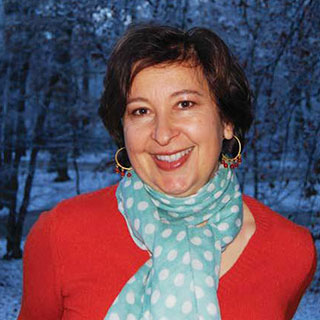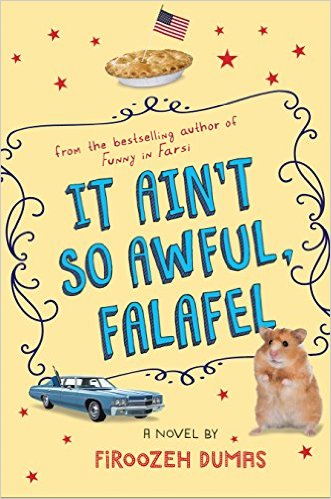 Firoozeh Dumas is the author of “Funny in Farsi” and “Laughing Without an Accent.” “It Ain’t So Awful, Falafel” is her first book of middle-grade fiction. The following is a complete transcript of her interview with Cracking the Cover for “It Ain’t So Awful, Falafel.”
Firoozeh Dumas is the author of “Funny in Farsi” and “Laughing Without an Accent.” “It Ain’t So Awful, Falafel” is her first book of middle-grade fiction. The following is a complete transcript of her interview with Cracking the Cover for “It Ain’t So Awful, Falafel.”
Why do you write? Why specifically for young readers?
I wanted to share a very difficult chapter in my adolescent life that shaped who I am today. I knew that many kids would benefit from reading my story. This is why in the dedication, I wrote, “To all the kids who don’t belong, for whatever reason. This one’s for you.”
Also, there is no literature for young readers that addresses US/Iran history and happens to be laugh out loud funny. As improbable as that combination sounds, I needed to fill that void.
How did writing a book for middle-graders differ than your two previous books?
This novel required seven years, and twenty-six versions. Suffice to say, it was far more challenging than my usual adult non-fiction. My adult writing pretty much comes down to retelling a story, with humor, in my adult voice. For this novel, I had to go back and remember who I was at age eleven and what were the things that really mattered? How did I see the world back then? I had to take a trip back to that time, and relive those years. It took a while to find the authentic voice of the characters. Once I did, they told me what to say. I wanted readers to believe that a young person was telling the story and I think I achieved that.
“It Ain’t So Awful, Falafel” is drawn from some of your own experiences. What made you want to share them?
I wanted to share my challenging experiences, like my father being unemployed, so all kids can have hope. Life is not easy for kids. Often, they must navigate their way through difficult situations without a road map. In some small way, I hope my book is a road map.
I also wanted readers, both girls and boys, to meet a Middle Eastern character who is funny and relatable. No such character currently exists. All the Middle Eastern characters in books are either oppressed or hopeless or mean. That is not an accurate representation!
Cindy and her family are dealing with some dark stuff and yet humor plays a role throughout. Was it hard to find a balance?
No, that was probably the easiest part. I’ve been writing humor for fifteen years and the balance in this novel is the same as my other books.
 You’ve made the events that took place in Iran in the 1970s easily digestible for young — and older — readers. How did you decide what to include and what to leave by the wayside? What kind of research was involved?
You’ve made the events that took place in Iran in the 1970s easily digestible for young — and older — readers. How did you decide what to include and what to leave by the wayside? What kind of research was involved?
I spent two years trying to figure the balance of history in this novel. That was the single hardest element. I didn’t want to write a history book but I wanted to include as much history as possible, while still keeping the story interesting for readers. I read many, many newspaper articles, I watched endless news clips, and I talked to people about their memories. I was happy when the book was finished because I felt like I had been living in the late 70’s, early 80’s for the second time. Once was enough for me!
What do you hope young readers come away with from your book?
First, I hope they say, “That was a great experience! Let’s go to the library and check out more books!” Second, I want them to become wiser, kinder and more hopeful as a result of my story. Last, I hope they become interested in history. I used to think history was the most boring topic on Earth until I took a class in college that sparked my interest. Now I think, “How can we make any important decisions without knowing history?”
Your new initiative is called the Falafel Kindness Project. What came first, the book or the initiative?
The idea for the initiative came to me as I was writing the book. The two just danced together. It’s was an organic coupling.
Why is the Falafel Kindness Project important?
There is so much conversation about bullying these days, and frankly, I don’t think it’s helping. We should be talking about kindness. Kindness is extremely powerful, and it takes so little to make a big difference in a person’s life. Anyone can be kind at any time. It’s a powerful tool we all have and I wanted kids to realize that power.
Is there a book from your own childhood that still resonates with you today?
Every book that I truly loved still resonates with me. My favorite books involved truths and that never changes.
